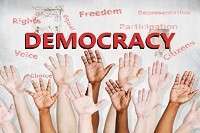
DEMOCRACY
Read the Passage carefully and answers the following Questions:-
Democracy, so long as it is what it is, imperfectly educated, throws a great responsibility on the leaders. The average voter even in educated England has no opinion of his own on many questions. He chooses his party by tradition or by his agreement with its central aims in those matters on which he has strong views. On other questions, he takes his opinions from the leaders. His conscience is clear when the party is chosen and for the rest, the leaders decide and the voters obey. In a complex social machine, it is difficult for the units to exercise though. It is easier to be obedient automata. It does not even pay to think. Perhaps thought may prove costly. If the leaders want to create public opinion, the machinery of the press and the wireless makes it most easy. Modern conditions afford propagandists vastly increased opportunities of promoting collective excitement and setting the world in a conflagration. A few clever and adventurous leaders can excite people’s passions and suppress intellectual freedom. In these circumstances, truth does not win as there is no attempt to find out the truth.
1. The most suitable title for the given passage would be
(a) Democracy and public opinion
(b) Democracy and intellectual freedom
(c) The role of leaders in a democracy
(d) The role of voters in a democracy
2. The opening sentence of the passage implies that
(a) the responsibility of educating a democracy lies with its leaders.
(b) leaders in democracy with imperfectly educated voters have to shoulder great responsibility.
(c) a well-educated democracy is based on responsible leadership.
(d) in a democracy with uneducated masses, the leaders are high duty conscious.
3. From the third sentence “He chooses his party by tradition “, we gather that
(a) an English voter selects a party which strongly stands for traditional and popular beliefs.
(b) the average voter in England votes for a party because of tradition irrespective of his agreement or disagreement with its basic policies.
(c) in England, an average voter supports a party either as a practice or because of his agreement with its broad policies.
(d) in a democracy one votes for a party with whose objectives and policies he agrees on all matters.
4. “In a complex social machine the statement implies that
(a) it is difficult for an individual to challenge complicated social machinery.
(b) in a society which works like a machine, an individual cannot be permitted to have his own political ambitions.
(c) in a mechanical age, a person cannot have individual aspirations.
(d) an individual finds it hard to formulate his own opinion in a complicated social structure.
5. The statement: “it does not even pay to think” means that
(a) thinking is actually discouraged.
(b) thoughtful persons are condemned.
(c) thinking brings no advantage.
(d) thinking is not allowed.
6. According to the author, it is most convenient for a leader to “create public opinion” because
(a) he has been chosen by the public whom he represents.
(b) the modern means of mass communication are readily available to him.
(c) even an educated voter takes his opinion from the leader.
(d) the average voter has no opinion of his own
7. The word ‘conflagration’ in the passage signifies
(a) confusion (b) widespread fire
(c) conflict (d) unforeseen calamity
8. Which of the following has the opposite ‘suppress’ as used meaning to the word in the passage?
(a) encourage (b) tolerate
(c) dominate (d) describe
9. Which of the following statements expresses most accurately the idea contained in the last sentence of the paragraph?
(a) Some adventurous leaders encourage people’s free thinking in an effort to get down to the true state of things.
(b) An overambitious leader infuriates the mob and thus spreads falsehoods to serve his own ends.
(c) At a time when clever leaders fan public feelings, nobody wants to know the truth which thus gets lost.
(d) When public fury is aroused by cunning leaders some people are fed on lies.
10. Which one of the following statements is not implied in the passage?
(a) In a democracy, an average voter is generally led by the leader.
(b) An individual in a democracy finds it easier to obey his leader than to do his own thinking.
(c) A propagandist leader in a democracy can excite mob hysteria so as to cloud the truth.
(d) A clever leader in a democracy arouses strong public frenzy in an effort to find out the truth.
ANSWERS:-
1. (c) 2. (b)
3. (c) 4. (d)
5. (c) 6. (b)
7. (a) 8. (a)
9. (c) 10. (d)
Download the above Passage in PDF (Printable)